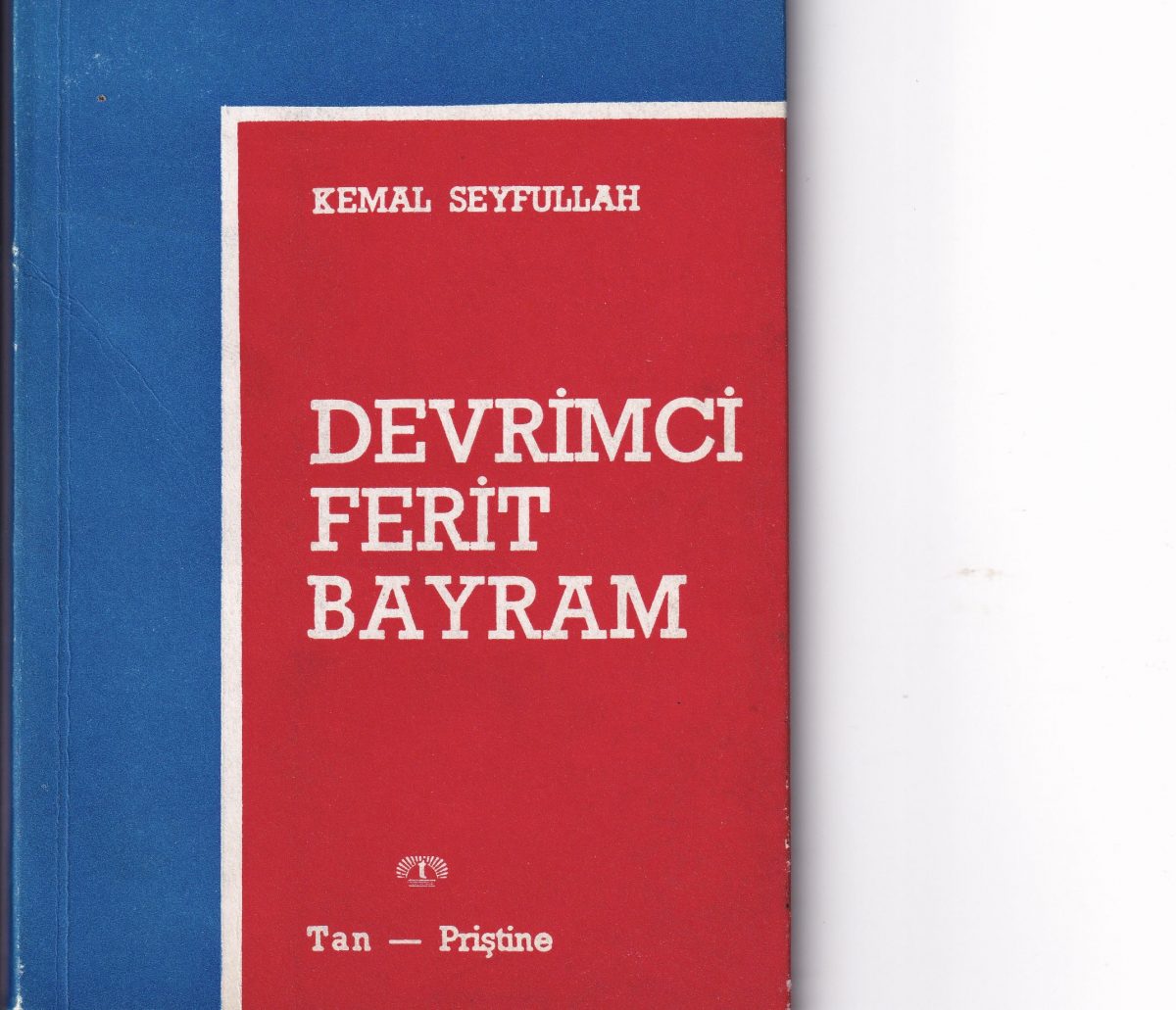Ferit Bayram (1888-1965) is a name we’ll mention often in our posts at BLLOGU. He was one of the most influential Turkish speaking leftist intellectuals in Yugoslavia. He wrote and published the first Turkish language alphabet in socialist Yugoslavia, in 1947. Active since the beginning of the twentieth century, Bayram was a teacher, editor, writer, translator, and political activist. Except for a slim book written by Kemal Seyfullah, there is not much literature available that depicts Bayram’s life. Seyfullah’s Devrimci Ferit Bayram [Revolutionary Ferit Bayram, Tan, Prishtina, 1978] is the only published book about him, and it is the subject of this blog. With this post we are also sharing a scan of this hard to find book.
Seyfullah was a comrade of Ferit Bayram, a partisan fighter and theoretician of nationalism, who read the eulogy at his burial. Based on Devrimci Ferit Bayram, and its references, Altay Suroy (born 1949), a lawyer and researcher based in Prizren, directed a documentary about Bayram in 1986, and contributed to a conference paper on the role of Ferit Bayram in disclosing the murder of Zef Lush Marku (in 1985). Lush Marku was an Albanian speaking communist activist from Kosovo, murdered secretly by the Serbian police in 1920 in Gjakova, while on his way to Prizren. Bayram, with his influence as a member of the Parliament—where he was elected through the Yugoslav Communist Party ticket—unearthed the killing and pressed the police to accept responsibility for the gruesome murder, which they never did. Marku was one of the first victims of monarchist terror against leftists and libertarian thinkers, which was to last until the end of the Second World War. Soon, with the declaration of a monarchist dictatorship in Yugoslavia (the Kingdom of Serbs, Croats, and Slovens) in the end of 1920, Bayram lost his post, and subsequent immunity as a member of the parliament, and went on to survive years of humiliation and repression which later emerged, again as an activist within the anti-fascist movement in the Second World War, now sixty years old and temporarily living in Mitrovica in Kosovo.
Ferit Bayram lived almost all his life in Skopje, together with Nakiye Bayram, who, alongside Rosa Plaveva, was one of the early women socialists active in Macedonia and Kosovo. Ferit’s politicisation started with joining the revolutionary Young Turks organisation Ittihat ve Terakki in 1908, and was active in efforts to overthrow the absolute monarchist power of the Sultan. Disappointed with the reactionary bourgeois position of Ittihat ve Terakki he left the organisation and became involved in the formation of the first Social-Democratic Party in Skopje, aligning itself with the German Socialist Party programme. This led to further politicisation; a May Day celebration in 1909, the translation of the Communist Manifesto into Turkish, his joining the Balkan federation, and most importantly his anti-war activities during the Balkan Wars and the First World War. After the Great War, Bayram joined the newly founded Yugoslav Communist Party and participated as a delegate to its foundational second congress in 1919, in Vukovar. He was editing Socijalisticka Zora and Sosyalist Fecri, agitating, together with Lush Marku among the Muslim polulation in Kosovo and Macedonia; he was active in the Skopje municipality, and, as a member of the Communist Party, was a member of the short-lived democratic parliament of the First Yugoslavia.
He was a product of the Balkan socialist tradition, torn between three great empires (Ottoman, Austro-Hungarian, and Russian), and countless small nations. These were activists theorising in the field; figuring out, from scratch, a new model of organisation that would be at the same time anti-imperialist, anti-nationalist, and anti-capitalist. On top of all these difficulties, they had to present this progressive model of socialist vision in language (Turkish, Albanian, Macedonian) to an illiterate peasant population who were far behind the developments happening elsewhere.
These obstacles did not deter the activists. Ferit Bayram, armoured with new socialist theories of the conception of nation, wrote the first Turkish language alphabet in 1947, worked as an advisor to the Ministry of Education of Macedonia, and continued to propagate progressive ideas among the Turkish speaking community in Macedonia and Kosovo until his death in 1965. His work influenced future theoreticians and writers in the Turkish language in Yugoslavia, such as Kemal Seyfullah, Necati Zekeriya, Hayrettin Volkan, Mustafa Karahasan, Şükrü Ramo and others who laid the grounds for all of the progressive and socialist ideas after the Second World War, including as well, the democratic and egalitarian understanding of the national question.
